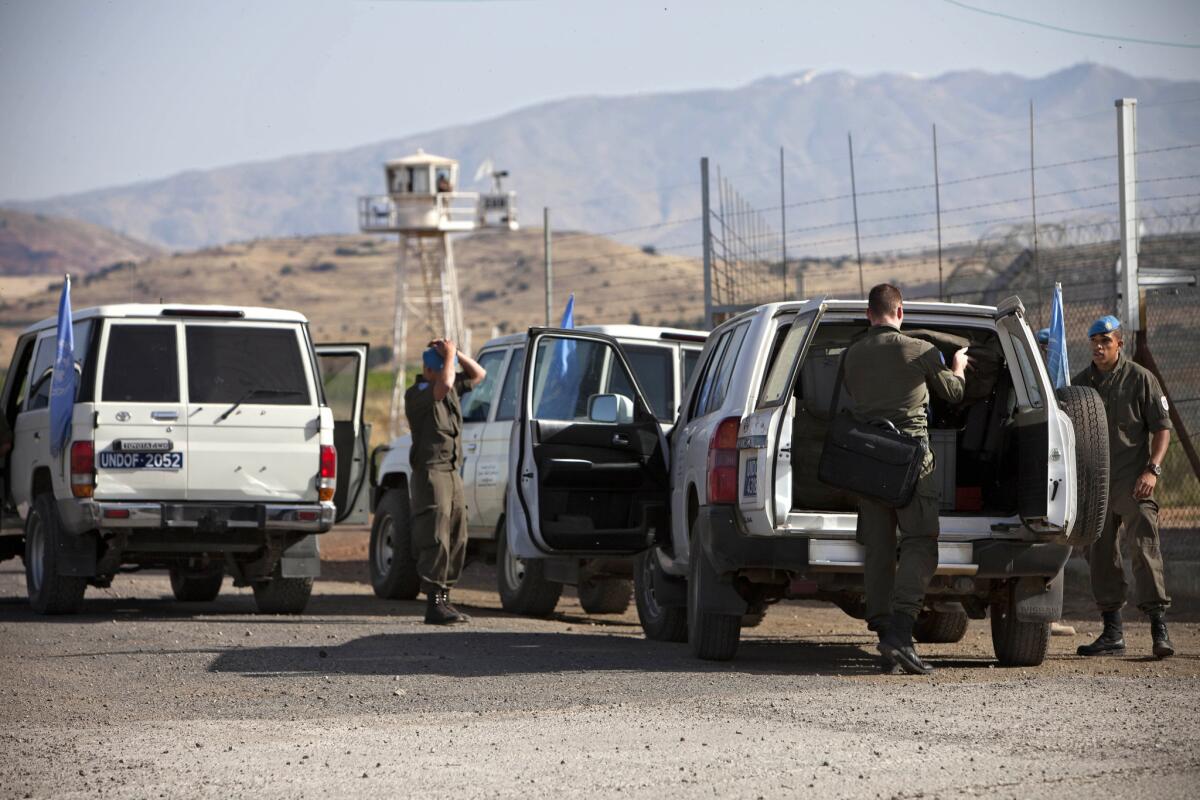Syria’s war hurts ties with Golan Heights Druze

- Share via
JERUSALEM -- Before fighting erupted in Syria, the Quneitra crossing served as a vital link between the Druze Arab communities in the Israeli-occupied Golan Heights and the country to which they belonged before the 1967 Middle East war.
Now, civilian traffic at the United Nations-supervised crossing, the only one along the cease-fire line between the two countries, has dwindled to virtually nothing, says Lt. Col. Peter Lerner, an Israeli military spokesman.
Quneitra is primarily used by international troops and humanitarian agencies. Among those crossing Wednesday were the first contingent of Austrian troops to withdraw from the U.N. observer force after their government decided the fighting made it too dangerous for them to remain in the area, according to media reports.
INSIDE SYRIA: More Times coverage
Druze apple farmers sent 18,000 tons of produce to Syria this year, but the export season ended Sunday, Lerner said.
For decades, young Druze from the Golan Heights villages Israel captured from Syria in 1967 have attended university in the Syrian capital, Damascus. Besides questions of language, family ties and politics, the free tuition and monthly allowance offered by the Syrian government attracted hundreds of students every year.
This year, however, just a few dozen students from the Golan Heights attended university in Syria, most of them medical students who had already completed most of their studies.
School is out now for these students, and it may be for a while. After Syrian rebels briefly overran the area where the crossing is located last week, Druze community leaders asked the Israeli authorities to facilitate the return of about 40 students from Syria to the Golan Heights.
According to Israeli media accounts, not a single student from the Israeli-occupied Golan Heights has enrolled for the next academic year in Syria.
Occasionally, civilians living on one side or another would cross for medical treatment, to get married or to attend a religious gathering. But Lerner said there has been “a serious decline” in most such activities.
Still, he said, “If there are … humanitarian needs, we will facilitate them, depending on the security conditions.”
Community activists were quoted as saying in recent months that efforts are under way to improve the Hebrew instruction offered to Druze students whose first language is Arabic and to ensure they graduate with Israeli high school diplomas, so more young people can attend university in Israel.
“The security situation is very dangerous, but there is no need for them to study in Syria anyway,” said Ayoub Kara, a former lawmaker from the Druze community, who argues that Syria is trying to “buy the students in order to cause tension against Israel.”
Traditionally, the Druze living on the Israeli side have declared loyalty to Syria, and most have rejected Israeli citizenship. An official in one of the Druze villages in the Golan Heights declined to discuss whether the hostilities have led the community to explore academic options in Israel, as Kara suggested in an interview with The Times.
Kara once hoped that the Quneitra crossing could serve as a bridge between communities and help improve relations in the region. But now, he says, “it’s impossible to promote anything.”
“We have to wait until this [fighting] blows over,” he said.
ALSO:
Israel advancing large settlement construction plan
Istanbul’s Taksim Square quiet after chaotic, violent night
Nelson Mandela ‘responding better’ to treatment, Zuma says
Sobelman is a special correspondent.
More to Read
Sign up for Essential California
The most important California stories and recommendations in your inbox every morning.
You may occasionally receive promotional content from the Los Angeles Times.













